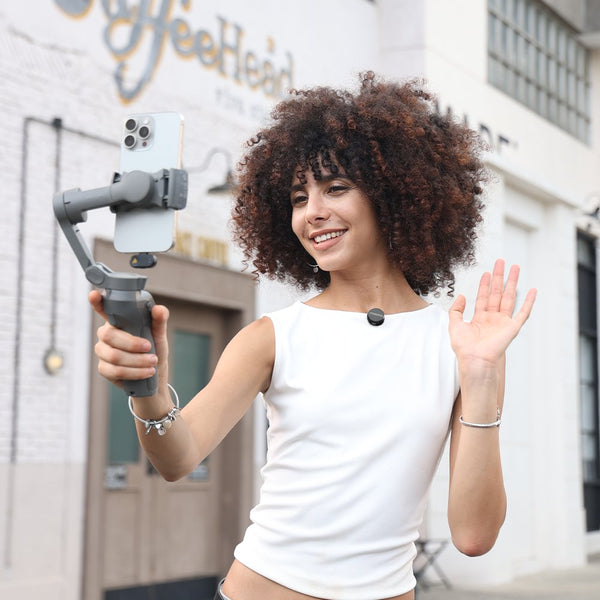The right recording microphone can transform your vocal performances from ordinary to extraordinary, capturing every nuance and emotion in stunning clarity. Whether you're a seasoned professional or just starting, understanding the differences between microphone types—like cardioid and omnidirectional—can elevate your sound quality and enhance your recording experience. Dive into the world of microphones and discover how the perfect choice can make all the difference in your audio production journey.
Choosing the right microphone can significantly impact the quality of your audio like when you’re recording vocals. Omnidirectional and cardioid microphones are popular among the various types of microphones available, each offering distinct advantages and characteristics. This article will explore the differences between these two microphone types, their benefits, and which recording microphone may best suit your recording needs.
What is the difference between an omnidirectional and cardioid microphone when recording audio?
The main difference between omnidirectional and cardioid microphones lies in their polar patterns, which determine how they capture sound from various directions.
- Omnidirectional Microphones: These microphones pick up sound equally from all directions (360 degrees around the mic). This characteristic makes them ideal for capturing ambient sound or when multiple sound sources are present. However, they can also pick up unwanted noise from the environment, making them less suitable for isolated vocal recordings.
- Cardioid Microphones: Cardioid microphones have a heart-shaped pickup pattern, primarily capturing sound from the front while rejecting noise from the sides and rear. This feature is beneficial for recording vocals, as it minimizes background noise and focuses on the primary sound source.
What is better, omnidirectional or cardioid?
Determining whether an omnidirectional or cardioid microphone is better depends on the recording context:
- Omnidirectional Microphones are excellent for capturing natural sound in environments where the ambiance is essential, such as in group vocals or orchestral settings. They are also favored for interviews or recordings where sound may come from multiple directions.
- Cardioid Microphones are often considered superior for solo vocal recordings, especially in studio environments. They help to isolate the voice, reduce background noise, and provide clearer sound quality, making them the preferred choice for singers and podcasters.
What are some examples of omnidirectional microphones?
Here are some popular examples of omnidirectional microphones:
- Rode NT-USB Mini: A versatile USB microphone that offers a compact design and excellent sound quality.
- Audio-Technica AT2020: Known for its exceptional performance in various settings, this microphone excels in capturing vocals and instruments.
- Shure MV88: A portable, high-quality microphone designed for mobile devices, ideal for capturing sound on the go.
- Maono WM820: A budget-friendly option, this omnidirectional lavalier microphone is suitable for interviews, presentations, film-making, and vlogging.

The Best Omnidirectional and Cardioid Microphones for Vlogging and Recording Vocals
1. Rode NT-USB (Omnidirectional):
A USB microphone that combines high-quality audio capture with user-friendly features, perfect for streaming and recording.
2. Sennheiser MKH 416 (Cardioid):
Renowned in the film and broadcasting industry, this shotgun microphone captures clear vocals while rejecting background noise.
3. Maono WM821 (Omnidirectional):
A versatile wireless Lavalier microphone that offers excellent audio quality for interviews, podcasts, and vlogging.

4. Shure SM58 (Cardioid):
An industry-standard vocal microphone known for its durability and clarity, making it perfect for live performances.
5. AKG P120 (Cardioid):
A condenser microphone that excels in capturing detailed vocals and instruments with minimal noise interference.
What are the benefits of using an omnidirectional or cardioid microphone while recording vocals?
Both omnidirectional and cardioid microphones offer unique benefits for vocal recording:
- Omnidirectional Benefits:
- Natural Sound Capture: They capture sound from all directions, creating a more natural audio environment.
- Ideal for Group Settings: Perfect for recording choirs or multiple vocalists simultaneously.
- Ambiance Recording: Excellent for capturing the acoustic characteristics of a room or environment.
- Cardioid Benefits:
- Noise Rejection: By focusing on sound from the front, they reduce background noise, making them ideal for studio recording.
- Vocal Clarity: Cardioid microphones produce clearer and more focused vocal recordings.
- Versatility: They can be used in various settings, from sound studio recordings to live performances.
What are the best microphones for laptop voice recording?
When recording vocals directly through a laptop, it's essential to choose a microphone that offers good sound quality and compatibility. Here are five of the best microphones for laptop voice recording, including one from Maono:
- Blue Yeti: A versatile USB microphone with multiple polar patterns, making it suitable for various recording scenarios.
- Audio-Technica AT2020USB+: A high-quality USB condenser microphone that captures detailed sound, perfect for vocals and instruments.
- Rode NT-USB Mini: Compact and easy to use, this microphone delivers excellent audio quality for podcasting and streaming.
- Maono PM461: A USB condenser microphone with a cardioid pickup pattern that offers great sound quality at an affordable price, ideal for beginners. It’s perfect for singing, recording, and podcasting, ideal for live streaming, gaming via YouTube and Twitch, online teaching, zoom meetings, and chatting via Facebook and Skype.

III. FAQs
1. How do Maono cardioid microphones compare to omnidirectional microphones?
Maono offers a variety of cardioid microphones that excel in vocal clarity and noise rejection. Compared to their omnidirectional counterparts, Maono cardioid microphones tend to provide clearer sound capture for solo vocalists by minimizing background noise. The choice between these two types often comes down to the specific recording environment and the intended application.
2. Where can I purchase Maono omnidirectional lavalier microphones?
Maono omnidirectional lavalier microphones are widely available online. You can find them on popular e-commerce platforms such as Amazon, eBay, and the official Maono website. Local electronics retailers may also carry their products, so it’s worth checking in-store as well.
3. What are the common issues users experience with Maono omnidirectional lavalier microphones, and how to resolve them?
Common issues users may experience with Maono omnidirectional lavalier microphones include:
- Low Volume: If the microphone sounds too quiet, ensure that the gain is appropriately set on your recording device.
- Solution: Adjust the input levels in your audio settings for better clarity.
- Background Noise:
- Solution: Since omnidirectional mics pick up sound from all directions, consider using them in quieter environments or employing noise reduction techniques during post-production.
- Connection Problems:
- Solution: If the microphone is not being recognized by your device, check the connections and ensure the correct input is selected in your audio settings.
V. Conclusion
Choosing between omnidirectional and cardioid microphones ultimately depends on your recording needs. Omnidirectional microphones are excellent for capturing a broad range of sound and are well-suited for group recordings or ambient sound capture. In contrast, cardioid microphones excel in isolating vocals, making them the go-to choice for solo recordings in noisy environments.
When selecting a microphone, consider factors such as the recording environment, the type of vocals being recorded, and your budget. The right microphone can significantly enhance your audio quality and elevate your recordings, whether you're a musician, podcaster, or content creator. With options like those from Maono and other reputable brands, achieving professional sound quality is more accessible than ever.



